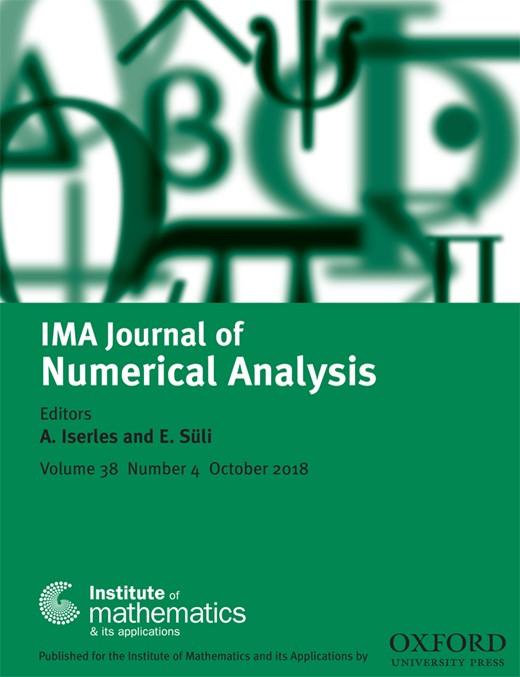-
Views
-
Cite
Cite
Chunmei Su, Wenfan Yi, Error estimates of a finite difference method for the Klein–Gordon–Zakharov system in the subsonic limit regime, IMA Journal of Numerical Analysis, Volume 38, Issue 4, October 2018, Pages 2055–2073, https://doi.org/10.1093/imanum/drx044
Close - Share Icon Share
Abstract
We establish the error estimates of a conservative finite difference method (CFDM) for the Klein–Gordon–Zakharov (KGZ) system with a dimensionless parameter |${\varepsilon} \in (0,1]$|, which is inversely proportional to the speed of sound. When |${\varepsilon} \rightarrow 0^+$|, the KGZ system collapses to the Klein–Gordon (KG) equation. In the subsonic limit regime, i.e., |$0<{\varepsilon}\ll1$|, the solution propagates waves with wavelength |$O({\varepsilon})$| and |$O(1)$| in time and space, respectively, with amplitude at |$O({\varepsilon}^{\alpha^\dagger})$|, where |$\alpha^\dagger=\min\{\alpha,1+\beta,2\}$|, |$\alpha\ge 0$| and |$\beta\ge-1$| are two parameters describing the incompatibility of the initial data of the KGZ system with respect to the limiting KG equation. This oscillation in time brings difficulties in designing numerical methods and establishing their error estimates in the subsonic limit regime. We propose a CFDM and analyse the error bounds in this article. By applying the energy method and the limiting KG equation, we obtain two independent error bounds at |$O(h^2/{\varepsilon}^{1-\alpha^*}+\tau^2/{\varepsilon}^{3-\alpha^\dagger})$| and |$O(h^2+\tau^2+{\varepsilon}^{\alpha^*})$| with |$h$| mesh size, |$\tau$| time step and |$\alpha^*=\min\{1,\alpha,1+\beta\}$|. Hence, we obtain uniform error bounds at |$O(h^2+\tau^{{2}/{4-\alpha^\dagger}})$| when |$\alpha\ge1$| and |$\beta\ge 0$|. While for |$\alpha=0$| or |$\beta=-1$|, the result suggests the meshing strategy requirement of the CFDM is |$h=O({\varepsilon}^{1/2})$| and |$\tau=O({\varepsilon}^{3/2})$| for |$0<{\varepsilon}\ll1$|.





